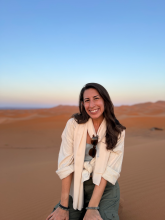Using Body-Based, Community-Centered Methods to Address Anxiety and Depression in Vulnerable Populations
Using Body-Based, Community-Centered Methods to Address Anxiety and Depression in Vulnerable Populations

Prior to joining the Stress, Trauma and Anxiety Research Clinic (STARC) at Wayne State University (WSU), I did not know much about the refugee community, aside from what was publicized as a political point of contention during the 2016 election. I now see it as the crisis that it truly is. The STARC team, directed by of Dr. Arash Javanbakht, had found a high prevalence of anxiety and depression in both Syrian and Iraqi refugee adults and children, with symptoms shared between mothers and their children. While watching a CNN report on this research work, an art therapist at WSU, Dr. Holly Feen-Calligan, noticed children taking time to themselves to draw and color. She asked a simple question—what is being done to help?
When considering trauma-focused interventions for vulnerable populations, it is important to consider elements like access to care, cultural and language barriers, and acceptance of treatment. Dr. Feen-Calligan had already observed the children selecting to engage with the visual arts. Dance is a large part of the Syrian and Iraqi culture. Both art and movement are great outlets for kids, especially those with chaotic behaviors common in those with anxiety disorders. For moms, Dr. Javanbakht’s yoga instructor Nicole Teufel joined in to provide trauma-informed mindful yoga. When it comes to community-based mental health care, it truly takes a village! And the whole team did it on a volunteer basis.
Each session was co-led by an Arabic individual who could also translate when needed. With our bilingual team, we were able to provide nine weeks of dance, art and yoga to Syrian and Iraqi refugees in collaboration with Samaritas resettlement agency. We placed a special emphasis on building coping skills. When kids told us how good deep breathing felt, we reminded them that whenever they felt scared, angry or sad, they could do this on their own to help them feel good again. We learned the importance of service access. Often a long drive to attend sessions was stressful and led to missed sessions. In teenage youth, this took too much time away from their obligations in the home. In this population, teenagers may have stronger English skills than their parents. Therefore: many must take on adult responsibilities to help the family resettle. Concurrently, parents may be working through their own traumatic experiences.
Most of all, we learned the importance of community. We saw friendships develop between moms and kids alike. Even after the sessions ended, some women drove across town to visit and practice yoga together. The painful and traumatic scars characterized by anxiety and depression do not define our resilient, loving, and triumphant refugee community, nor do they define any one of us. By providing trauma-informed and culturally mindful interventions that are accessible and community oriented, we can aid the healing process by adapting these core values, not only for this particular group, but for any group in need.












